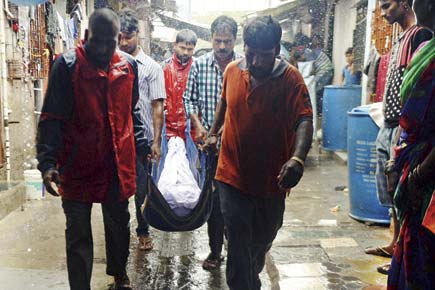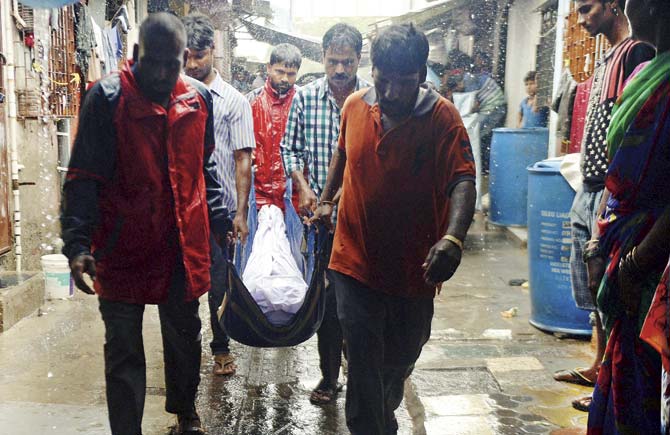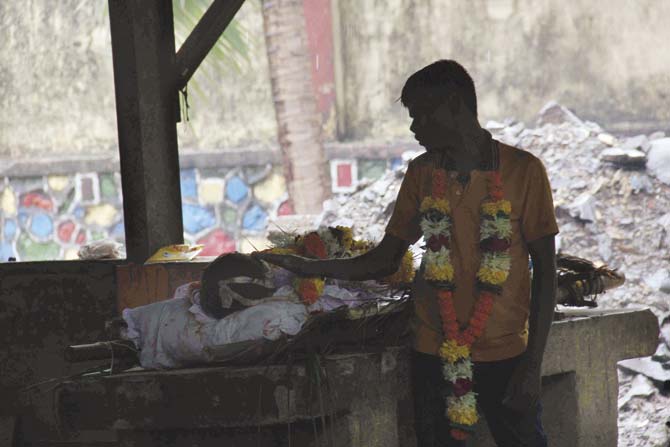Even as dozens of critical patients from Malwani were rushed to Shatabdi Hospital on Thursday evening, the dialysis centre, which is run by a trust and shuts at 5 pm, was not reopened

With spurious liquor claiming at least 104 lives in Malwani, it has emerged as the city’s worst hooch tragedy. However, it now seems that the lethal liquor might have taken a greater toll because many of the patients at a BMC-run hospital did not receive timely dialysis, required to flush out toxic methanol from their bodies.
ADVERTISEMENT
Mumbai liquor tragedy: CM wants death penalty for Malwani hooch culprits

Most of the victims of the Malwani hooch tragedy suffered kidney failure, as a direct result of methanol intake, and were in dire need of dialysis
As the deadly hooch began taking effect around 8.30 pm on Thursday evening, a majority of the patients as many as 139 were rushed to Shatabdi Hospital in Kandivli, which is one of the largest public medical facilities in the vicinity. Despite its scale, however, Shatabdi is a secondary care centre and lacks a dedicated nephrology, plastic surgery or neurosurgery department.
Mumbai liquor tragedy: 5 more families say hooch killed their loved ones, cops blame it on illness

A family member performs the last rites of one of the victims of the Malwani hooch tragedy at a crematorium in Malad. Having claimed 104 lives, this counts as the worst hooch tragedy in the city
Instead, the dialysis centre there is run by the private trust, Naminath Jain Foundation under a public-private partnership. However, the centre had already shut by 5 pm, and was not reopened despite the dire need of the hooch patients. Many of the patients were in need of dialysis, but not all were medically fit to be moved to other hospitals.
Even those who were, had to wait at least five to six hours before they could be transferred and complete the whole documentation process. The numbers tell the rest of the story: within 24 hours, there were at least 50 casualties reported at Shatabdi, that has so far seen a total of 61 deaths in this case.
The hospital transferred 60 patients who were in need of dialysis or better medical facilities to KEM, Nair and Sion hospitals or other private hospitals across the city. However, doctors have indicated that many deaths could have been avoided had the patients been provided dialysis at Shatabdi itself.
But according to Dr Krishnakant Pimple, medical superintendent at Shatabdi Hospital, the private trust-run facility could only run from 9 am to 5 pm as per the contract. However, even when the dialysis centre reopened the next day (Friday), it remained busy with its own patients and did not provide treatment to the hooch patients.
“The trust-run facility had their own patients to attend to, and the hospital had no control over the facility to ask them to treat the hooch patients. The trust had 70 other patients to attend to, who are suffering from chronic kidney ailments and need dialysis twice or thrice a week,” Dr Pimple told mid-day.
The deceased victims at Shatabdi were sent for post-mortem to the Bhagwati post-mortem centre, where the chief, Dr Shivaji Kachare agreed that dialysis had an important role to play in treating the patients.
“Unlike ethanol (drinking alcohol), methanol takes time to affect the organs.
Once it changes into formic acid, it begins to affect the kidneys and liver and that’s when the patient needs to be put on dialysis and life support immediately,” he said. 27 patients were shifted to Nair Hospital, of whom 10 succumbed during treatment, while the remaining are said to be critical but stable.
“The exact cause of death is yet to be disclosed and will only be known after the chemical analysis findings from the state-run forensic laboratory. But on the other hand, we can’t deny that immediate treatment could’ve saved more lives. Methyl alcohol or methanol has direct neurological and nephrological effects, and if not attended on time, it could be fatal,” said a doctor at Nair, on the condition of anonymity.
At KEM, four out of 16 transferred patients died as they were in a critical condition, while of the remaining 12, six were put on dialysis and are now showing improvement, said the dean, Dr Avinash Supe. Similarly, according to the on-duty Assistant Medical officer (AMO) at Sion Hospital, Dr Sarita Patil, of the six transferred patients, three were in immediate need of dialysis.
Mumbai hooch tragedy: More people flock to hospitals just to be safe
The management at Shatabdi Hospital, however, maintained that none of their patients were put through any inconvenience or danger. “The claims that we could have saved more patients by offering timely dialysis but we delayed it, are totally false. Whoever needed dialysis was moved to other hospitals,” said medical superintendent Dr Pimple.
 Subscribe today by clicking the link and stay updated with the latest news!" Click here!
Subscribe today by clicking the link and stay updated with the latest news!" Click here!






